In March 2025, a devastating 7.7 magnitude earthquake shook central Myanmar, leaving homes shattered and lives upended. Amid the rubble and aftershocks, it was older people—often the most invisible in emergency response—who bore the heaviest burden.
In towns and villages already stretched thin by conflict, economic instability, and limited infrastructure, the earthquake added another layer of trauma. It didn’t just destroy buildings. It destroyed routines, safety nets, and the quiet dignity of growing old in peace.
HelpAge global network member AGE Myanmar spoke with older survivors to understand what they’re facing—not just physically, but emotionally and mentally. Their stories, featured here, offer a glimpse into their experiences and remind us that older people are not just victims. They are caregivers, heads of households, and community pillars—and they need to be included, protected, and seen.
“This is the biggest loss of my life.” — U Tin Win, 76
A retired district law officer, U Tin Win had built a modest life with his daughter and grandchildren. When the earthquake struck, their fragile apartment collapsed. He was injured—his back slammed into a brass bedframe—and couldn’t move for five days.
“We slept on the pavement,” he said. “We had no choice.”
Now displaced and crammed into a rental they can barely afford, the family survives on his pension and food donations. Once a provider, U Tin Win now relies on others—a reversal that leaves him feeling stripped of dignity.
“I used to be the one giving,” he said. “Now I have to take. It hurts so bad.”
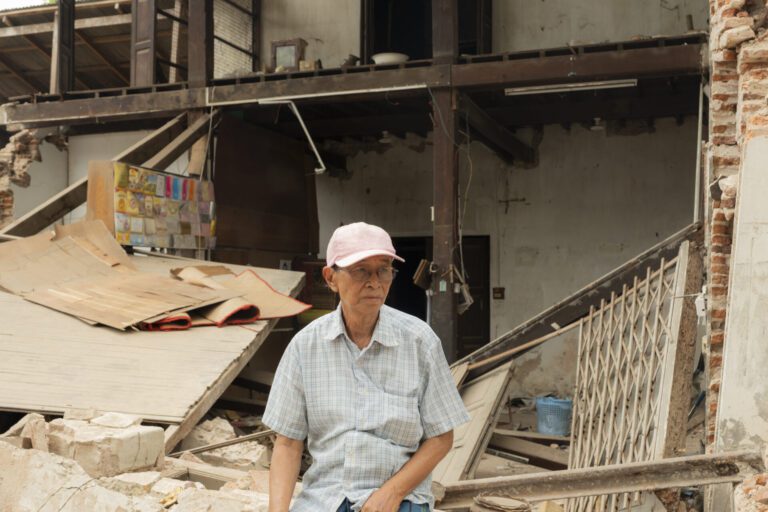
“We had to jump out the window.” — U San Win, 61
While mourning the death of his grandchild, U San Win’s world cracked open again—this time literally. Buildings collapsed during the funeral ceremony, and he escaped by jumping out a window. Racing home by boat, he found his wife and grandchildren standing in mud and rubble—soaked, frightened, and homeless.
They now shelter with three families in one small house. “I don’t want to walk around my village anymore,” he said. “Everything reminds me of what we lost.”
He hasn’t returned to his work as a farmer. “If we just had a place to live,” he said, “we could start again.”
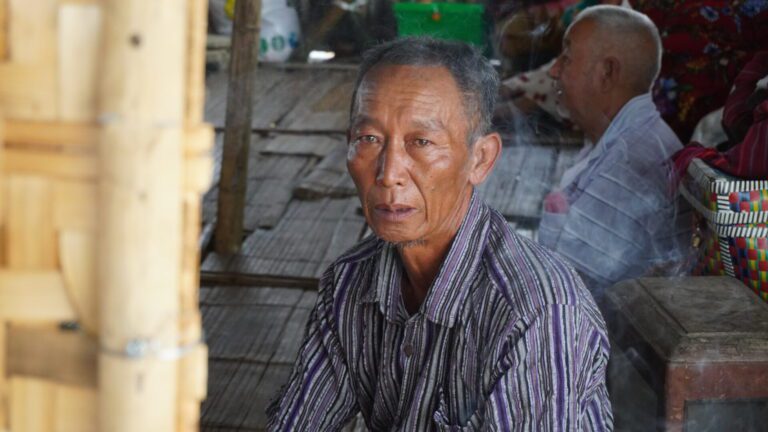
“All I want is a home.” — Daw Kyi Kyi Win, 86
When the earthquake struck Mandalay, Daw Kyi Kyi Win was reading quietly in her third-floor apartment when the earth began to tremble. Neighbors rushed in and carried her down the damaged stairs to safety. Her family escaped uninjured, but their building was left structurally unsound. “We lost everything,” she says. “The pantry, closets, dishes—all gone.”
After the earthquake, Daw Kyi Kyi Win and her family spent a week living on the pavement and now reside in an emergency shelter with more than 700 others. Her health has deteriorated and she suffers from kidney disease and leg swelling, yet receives no medical aid. The shared shelter facilities, including toilets and showers shared among hundreds, add to her discomfort.
“There are 10 to 15 people waiting when I need the toilet,” she says. “Sometimes we knock and ask, but people won’t come out. I have to wait. It’s very hard.” Even bathing has become a public ordeal. “This is a lake area,” her grandchild adds. “We wait in line, and then we help her wash. There’s no privacy.”
Despite these hardships, Daw Kyi Kyi Win remains resilient. “We just want what is necessary. All I want is a home,” she says. “I just want to be healthy, and a place to stay. I don’t want anything else.
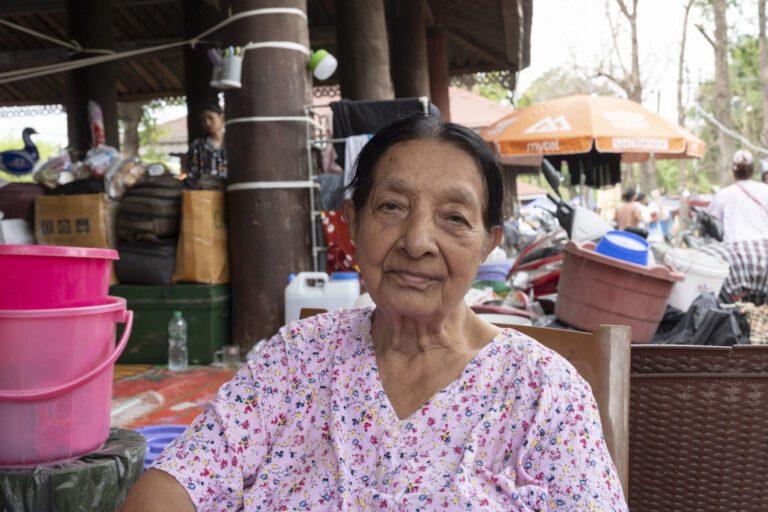
“I covered my head with a blanket and prayed.” — Daw San Lwin, 70
Resting upstairs after lunch, Daw San Lwin feared for her life as the building swayed like a hammock. She spent nights sleeping outside, eventually sent to stay with relatives for safety. Her home, sandwiched between cracked high-rises, remains dangerous. “If they fall, they’ll crush us.”
She suffers chronic pain and relies on her daughter, who supports them both. Like many older people, her access to healthcare is uncertain. Her registration for emergency aid came late, so she hasn’t received support—but she finds comfort seeing others helped.
“I give thanks to every donor,” she said. “Their kindness gives us hope.”
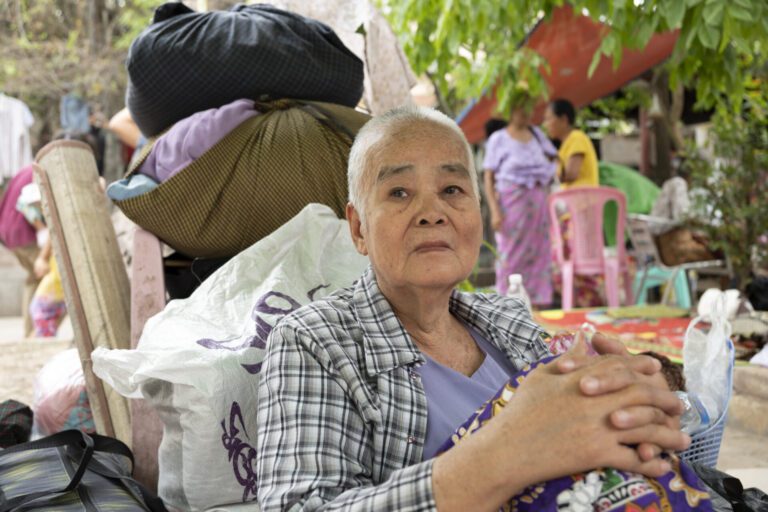
“If it happens again, I will die.” — Daw Khin Myaing, 87
The repeated earthquakes stole more than just shelter from Daw Khin Myaing—they’ve also taken her independence.
One of the oldest survivors of the earthquake, Daw Khin Myaing now sleeps on the floor with eleven others. The walls of her home are cracked and unstable, and her loved ones refuse to let her return.
The emotional toll is immense. “The children said it wasn’t safe for me. Then another earthquake happened. They keep coming.” For her, safety and connection are what matter most now. “I only packed two or three sets of clothes. I left everything behind.”
“I was confident walking alone. Now, I can’t even go to the toilet without my walker and my granddaughter. I don’t dare,” she says. “In the mornings, I wake up dizzy. I need help just to sit up. If I want to eat, I have to ask someone to get it for me.”
“I can’t sleep alone anymore,” she said. “I feel like a burden.”
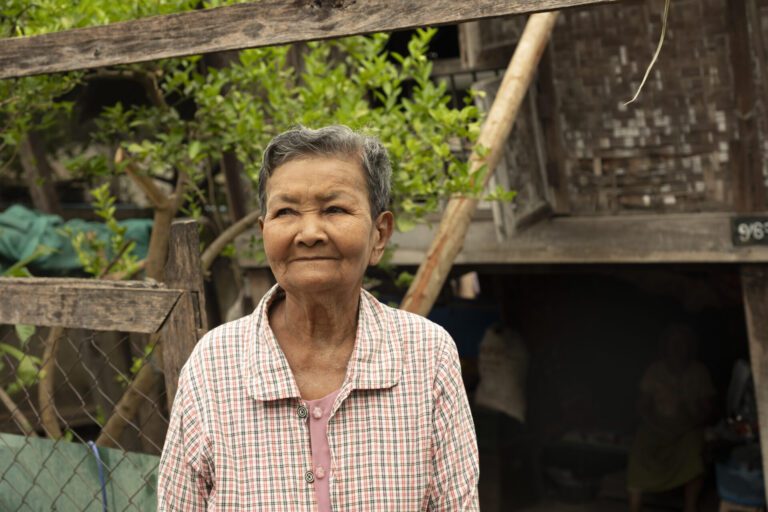
“I shouted for him to come down.” — Daw Pyone, 62
Weak from anemia and needing regular blood transfusions, Daw Pyone depends on her son, who narrowly escaped injury when the bed upstairs collapsed under him. When the earthquake struck, the shaking was sudden and violent. “I shouted for him to come down. Things were falling. We didn’t know what to do. After the quake, we were too scared to stay. We ran to the fields with others.”
“I haven’t been able to eat. I’m terrified,” she says. Every sound feels like a new earthquake. She won’t go upstairs anymore. Her home, though still standing, is deeply cracked—and now haunted by fear.
More than anything, Daw Pyone is worried about her health. With hospitals overwhelmed, she fears she’ll be forgotten. “O negative is rare. One out of 100, they say. I have to buy it myself. And now, I don’t think they’ll have time for me.” She’s considered asking the local monastery for help. “If they can’t get the blood in time, I don’t know what will happen.”
The cost of hospital rooms is rising too. “It’s hard. It was already hard before. Now it’s worse.”
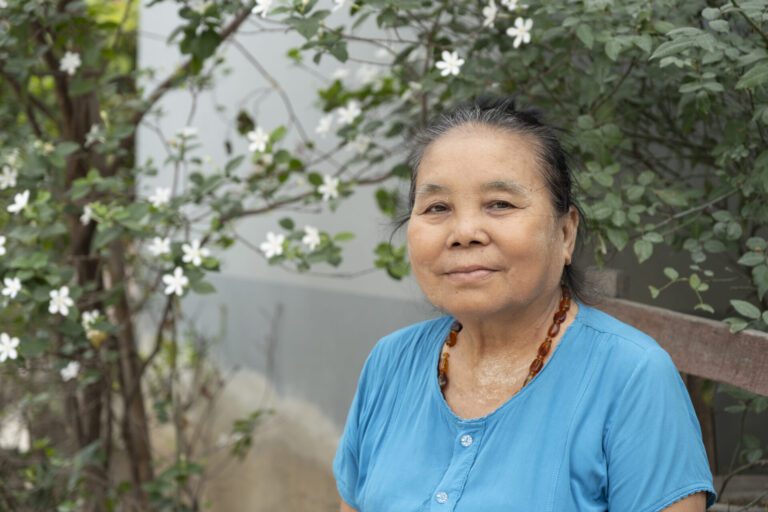
“I live alone.” —Daw Htay Kyi, 78
Living alone for many years, Daw Htay Kyi is the only unmarried sibling in her family. What once symbolized her independence and strength has now become a challenge. “I live alone,” she says. Since the earthquake, she has been sleeping outside with her nephews in an alleyway in front of a neighbor’s home. “There is no covering. We just sleep in the street.”
Daw Htay Kyi, who is partially deaf, describes the panic and confusion that followed when the earthquake began. “I heard a loud boom, boom, boom and ran outside. If I hadn’t run, I would have been crushed.”
Her small home—her sanctuary—collapsed entirely. “My clothes, my trunk, my bed are buried under the rubble.”
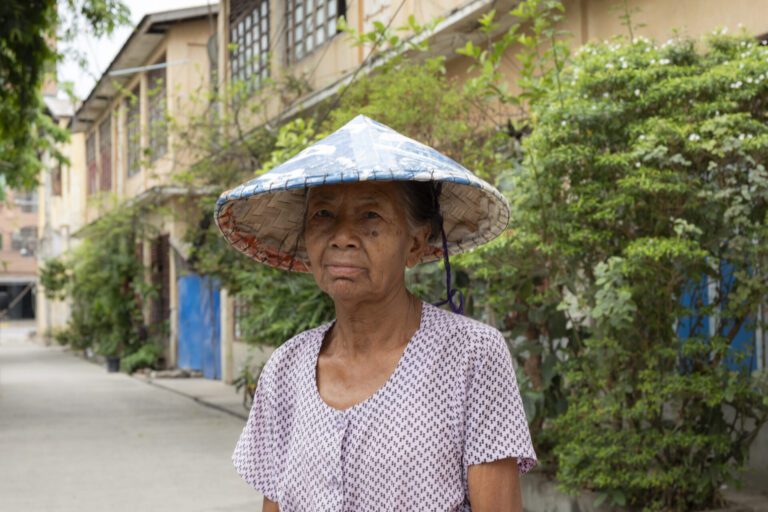
Why These Stories Matter
Across Myanmar, older people are being pushed to the margins of emergency response. Their needs—like healthcare, safe shelter, mobility assistance, and mental health support—are too often overlooked. But their resilience, wisdom, and contributions are irreplaceable.
At HelpAge, we believe older people have the right to safety, dignity, and support—especially during humanitarian crises and disasters. That’s why our global network is working to ensure that older people’s voices are heard and their needs are not forgotten.
We are calling on donors, partners, and supporters to stand with us. Because no one should have to age through crisis alone.
